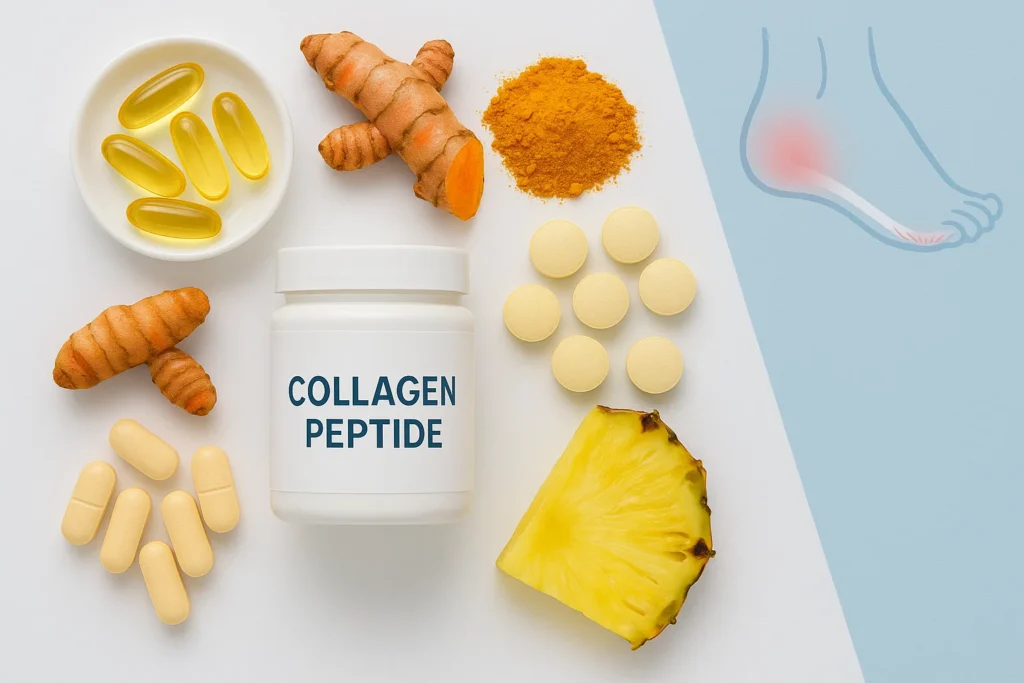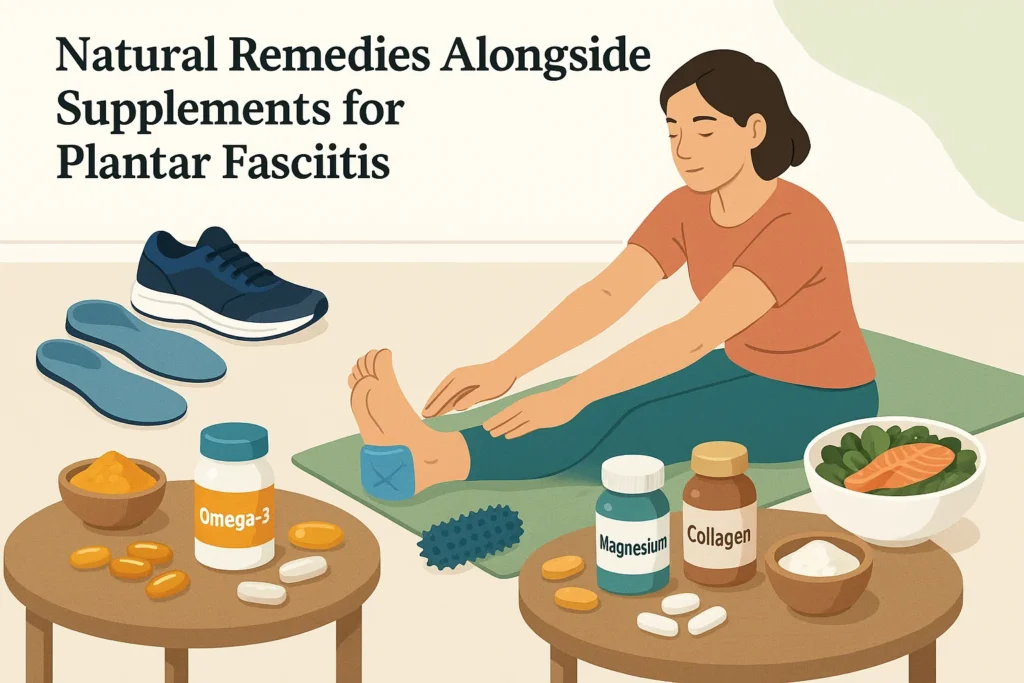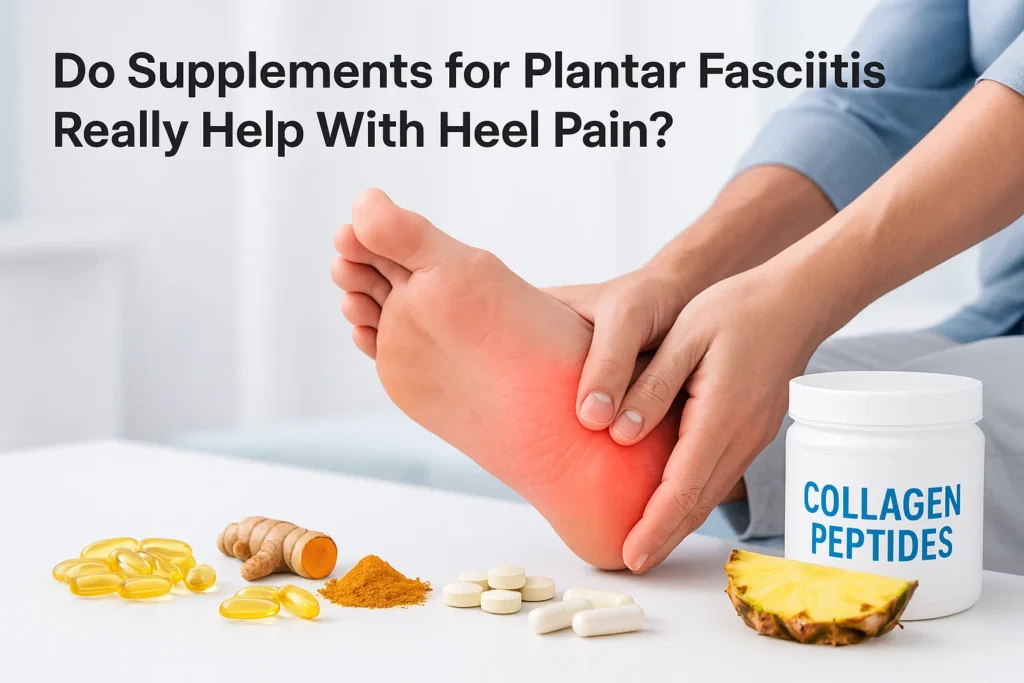Introduction
Plantar fasciitis is one of the most common causes of heel pain, affecting athletes, runners, and even people who spend long hours standing. It happens when the plantar fascia, a thick band of tissue that connects your heel bone to your toes, becomes inflamed or damaged.
While treatments like stretching, physical therapy, and orthotics are widely recommended, many people also wonder if supplements for plantar fasciitis can speed up healing or reduce discomfort. Vitamins, minerals, and anti-inflammatory supplements are often promoted as natural remedies that support tissue repair, reduce swelling, and improve recovery.
But do these supplements really work? Or are they just a temporary relief solution with limited scientific backing? In this article, we’ll explore the role of nutrition, vitamins, and natural supplements in plantar fasciitis, look at the most commonly recommended options, and review whether they actually help with heel pain relief.
What Causes Plantar Fasciitis and Heel Pain?
Plantar fasciitis develops when the plantar fascia ligament—a thick band of tissue that runs across the bottom of your foot—becomes inflamed, irritated, or torn. This condition is especially painful near the heel and often feels worse after waking up or standing for long periods.
Common Causes:
- Overuse and repetitive strain – Running, walking long distances, or standing on hard surfaces puts stress on the fascia.
- Obesity or sudden weight gain – Extra body weight increases heel pressure.
- Poor footwear – Shoes without proper arch support can lead to micro-tears in the fascia.
- Tight calf muscles or Achilles tendon – These put extra stress on the heel.
- Vitamin deficiency and weak connective tissues – Lack of magnesium, vitamin D3, or collagen peptides may slow down natural tissue repair.
Since inflammation plays a major role in plantar fasciitis pain, many people turn to anti-inflammatory supplements and natural remedies for heel pain instead of or alongside painkillers. These may help reduce swelling and support the healing process.
Role of Supplements in Healing Plantar Fasciitis
When the plantar fascia becomes inflamed, the body’s natural healing response depends heavily on nutrition, vitamins, and minerals. While supplements are not a cure on their own, they can play a supportive role in reducing inflammation, strengthening tissues, and speeding up recovery when combined with other treatments like stretching, orthotics, and rest.
How Supplements Help:
- Reducing inflammation: Certain anti-inflammatory supplements such as omega-3 fatty acids, turmeric (curcumin), and bromelain may help control swelling and pain.
- Supporting tissue repair: Nutrients like vitamin C and collagen peptides play an important role in building connective tissue and improving ligament strength.
- Strengthening bones and muscles: Vitamin D3 and magnesium supplements can improve bone density and muscle flexibility, which reduces strain on the plantar fascia.
- Enhancing circulation and healing: Supplements such as zinc may boost wound healing and help restore damaged tissues faster.
In short, supplements act as supportive nutrition for plantar fasciitis, but they should be considered part of a broader treatment plan rather than a stand-alone solution.
Best Supplements for Plantar Fasciitis Relief

When it comes to easing heel pain and supporting recovery from plantar fasciitis, certain supplements stand out for their ability to reduce inflammation, repair tissues, and improve overall foot health. Below are the most widely recommended options:
Omega-3 Fatty Acids
Found in fish oil and flaxseed, omega-3 fatty acids are well-known for their anti-inflammatory properties. They help reduce swelling in the plantar fascia and may provide long-term relief from foot pain.
Vitamin C
Essential for collagen production, vitamin C plays a critical role in repairing connective tissues and ligaments. A deficiency may slow healing, making supplementation helpful in cases of chronic plantar fasciitis.
Vitamin D3
Low levels of vitamin D are linked to bone and muscle problems, which may worsen heel pain. Supplementing with vitamin D3 supports bone strength, tissue repair, and overall foot health.
Magnesium
Magnesium supplements help relax muscles, reduce cramping, and improve circulation. Since tight calf muscles often contribute to plantar fasciitis, maintaining proper magnesium levels can ease strain on the heel.
Turmeric (Curcumin)
A powerful natural remedy, turmeric contains curcumin, which has strong anti-inflammatory and antioxidant effects. Studies suggest it may help lower chronic heel pain without the side effects of NSAIDs.
Glucosamine & Chondroitin
Often used for joint health, glucosamine and chondroitin may also benefit people with plantar fasciitis by improving cartilage and fascia flexibility, reducing stiffness in the foot.
Collagen Peptides
Collagen supplements help restore elasticity and strength in connective tissues. Since the plantar fascia is made of collagen fibers, supplementing may enhance recovery and reduce micro-tears.
Bromelain
Extracted from pineapples, bromelain is a natural enzyme that reduces inflammation and swelling. It can be especially useful for those looking for natural alternatives to painkillers.
These supplements for plantar fasciitis are most effective when combined with stretching, supportive footwear, and physical therapy. While they may not cure the condition alone, they can significantly support recovery and ease heel pain.
Do Supplements Actually Work? (Scientific Evidence)
Many people ask whether supplements for plantar fasciitis truly work or if they are simply overhyped remedies. The scientific evidence suggests that while supplements may not cure the condition on their own, certain vitamins, minerals, and natural anti-inflammatory supplements can support recovery and ease heel pain when combined with proper treatment.
What Research Says:
- Turmeric (Curcumin): Studies show curcumin has strong anti-inflammatory effects, similar to over-the-counter pain relievers, but with fewer side effects. It may help reduce chronic heel pain linked to plantar fasciitis.
- Omega-3 Fatty Acids: Research indicates that omega-3 supplements can lower systemic inflammation, which plays a major role in plantar fascia irritation.
- Vitamin D Deficiency: Several studies connect low vitamin D levels with increased musculoskeletal pain. Supplementing may help reduce heel and foot pain in deficient individuals.
- Collagen Peptides: Clinical trials suggest collagen may improve tendon and ligament healing, which supports the damaged plantar fascia fibers.
- Magnesium: Limited studies suggest magnesium deficiency can contribute to muscle tightness and cramps, both of which may worsen plantar fasciitis pain.
The Bottom Line
Supplements are not a standalone cure for plantar fasciitis. Instead, they should be considered as supportive nutrition that helps reduce inflammation, improves tissue repair, and strengthens connective structures. For best results, they work best when combined with stretching exercises, orthotics, physical therapy, and proper footwear.
Natural Remedies Alongside Supplements

While supplements for plantar fasciitis may provide nutritional support, they work best when combined with simple, everyday remedies that target the root cause of heel pain. These natural treatments reduce strain on the plantar fascia, improve flexibility, and speed up recovery.
Stretching Exercises
Regular plantar fasciitis stretches can loosen tight calf muscles and relieve tension in the heel. Simple routines, such as rolling your foot on a frozen water bottle or stretching your Achilles tendon, are highly effective.
Supportive Footwear and Orthotics
Wearing shoes with proper arch support or using custom orthotic insoles can reduce pressure on the plantar fascia. Supportive footwear is often recommended alongside supplement use for long-term relief.
Massage and Physical Therapy
Foot massage, myofascial release, and professional physical therapy help increase blood flow and reduce stiffness. These treatments support the healing process, especially when paired with anti-inflammatory supplements.
Ice Therapy
Applying an ice pack to the heel for 15–20 minutes daily helps reduce swelling and provides quick pain relief. It’s a simple remedy that complements natural supplements for heel pain.
Anti-Inflammatory Diet
In addition to supplements, a diet rich in anti-inflammatory foods can make a big difference. Include:
- Fatty fish (salmon, sardines – rich in omega-3 fatty acids)
- Leafy greens (kale, spinach)
- Spices (ginger, turmeric)
- Nuts and seeds
This approach provides the body with the right nutrients while reducing chronic inflammation.
Safety, Dosage, and Precautions
Although supplements for plantar fasciitis can support healing, it is important to take them safely. Not every supplement works for everyone, and incorrect dosage or mixing with medications may cause side effects.
General Dosage Guidelines
- Omega-3 Fatty Acids: 1,000–2,000 mg per day (consult a doctor if on blood thinners).
- Vitamin C: 500–1,000 mg daily is generally safe for supporting connective tissue repair.
- Vitamin D3: Dosage depends on blood levels. Many adults require 1,000–2,000 IU daily, but a deficiency may need higher amounts.
- Magnesium: 200–400 mg per day can help with muscle relaxation and circulation.
- Turmeric (Curcumin): 500–1,000 mg daily with black pepper extract for better absorption.
- Collagen Peptides: 5–10 grams daily, often mixed in shakes or smoothies.
- Bromelain: 200–400 mg, usually taken between meals.
Safety Considerations
- Overuse Risks: High doses of certain supplements (such as vitamin D, magnesium, or fish oil) can cause digestive issues, blood thinning, or toxicity.
- Drug Interactions: Supplements like turmeric, omega-3, and bromelain may interact with blood thinners or anti-inflammatory medications.
- Pre-existing Conditions: People with kidney disease, liver issues, or chronic health conditions should seek medical advice before taking supplements.
- Not a Replacement: Supplements should never replace professional treatment such as stretching exercises, orthotics, or physical therapy.
When to See a Doctor
If heel pain persists for several weeks despite lifestyle changes and supplements, consult a healthcare provider. Chronic or severe plantar fasciitis may require medical treatments such as corticosteroid injections, shockwave therapy, or surgery.
FAQs About Supplements for Plantar Fasciitis
Does vitamin D deficiency cause plantar fasciitis?
Vitamin D deficiency does not directly cause plantar fasciitis, but low levels are linked to musculoskeletal pain and weak connective tissues. Supplementing with vitamin D3 may help improve bone health and reduce heel pain in people who are deficient.
What is the best supplement for plantar fasciitis pain?
There is no single best supplement, but commonly recommended options include omega-3 fatty acids, turmeric (curcumin), magnesium, and collagen peptides. These support inflammation control and tissue repair.
Do collagen supplements work for heel pain?
Yes. Since the plantar fascia is made of collagen fibers, taking collagen peptides may help improve ligament strength and repair micro-tears, supporting recovery from heel pain.
Are supplements better than painkillers for plantar fasciitis?
Supplements may reduce inflammation and aid long-term healing, while painkillers only provide temporary relief. For most people, a combination of natural supplements, stretching, and supportive footwear is more effective than relying on medication alone.
How long do supplements take to work for plantar fasciitis?
Results vary, but many people notice improvements within 4–8 weeks of consistent use, especially when supplements are combined with lifestyle changes such as stretching, ice therapy, and orthotics.
Conclusion
Plantar fasciitis is one of the most common causes of heel pain, and while recovery often requires a combination of rest, stretching, and supportive footwear, supplements for plantar fasciitis can play an important role in the healing process. Nutrients like vitamin C, vitamin D3, magnesium, collagen peptides, omega-3 fatty acids, and turmeric provide the body with essential support for reducing inflammation and repairing connective tissue.
That said, supplements are not a cure on their own. They work best as part of a comprehensive treatment plan that includes physical therapy, lifestyle changes, and medical guidance when needed.
If you’re considering adding supplements to your routine, always consult with a healthcare provider to ensure proper dosage and avoid potential interactions with other medications. With the right approach, supplements can be a safe, natural way to support recovery and reduce plantar fasciitis heel pain over time.


